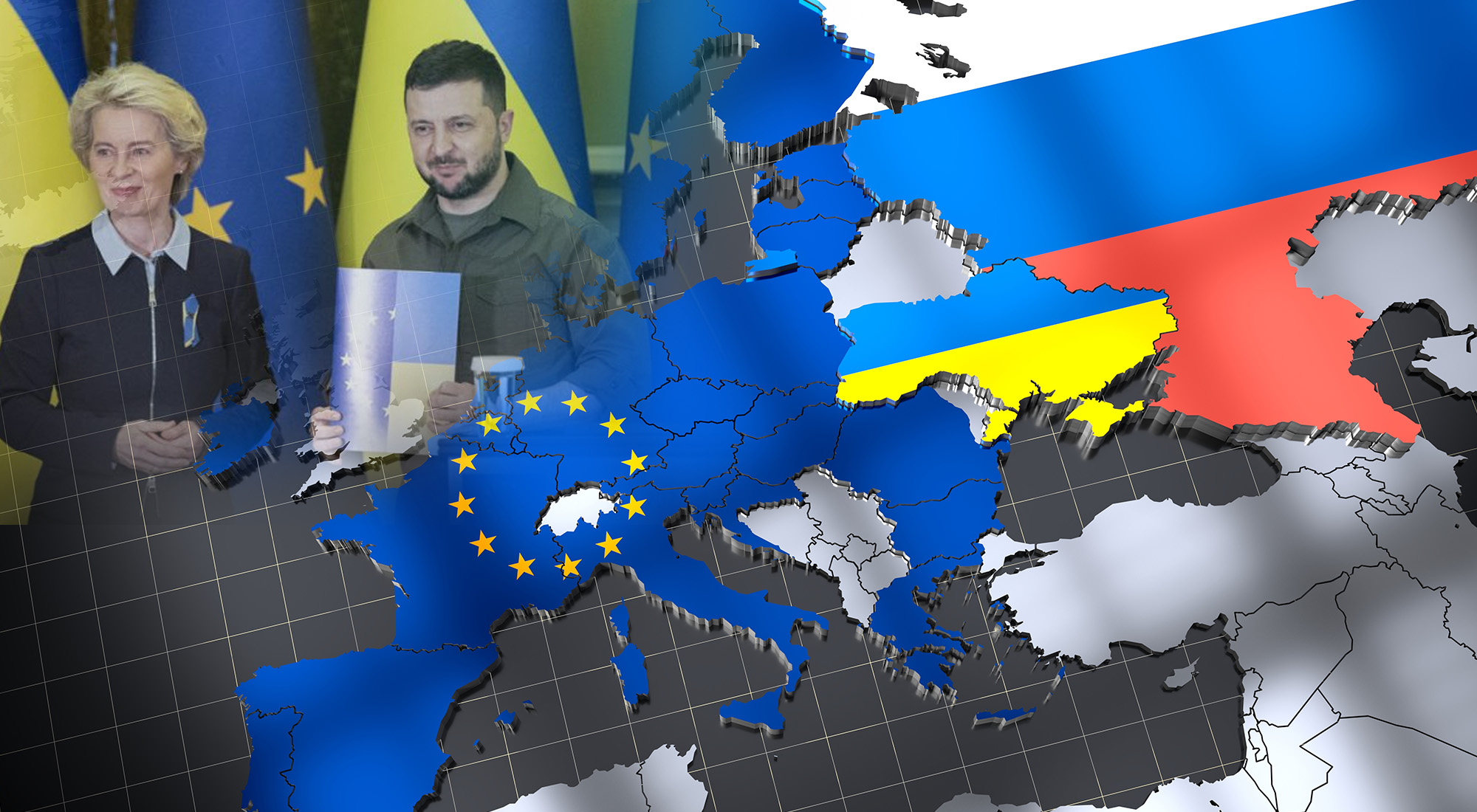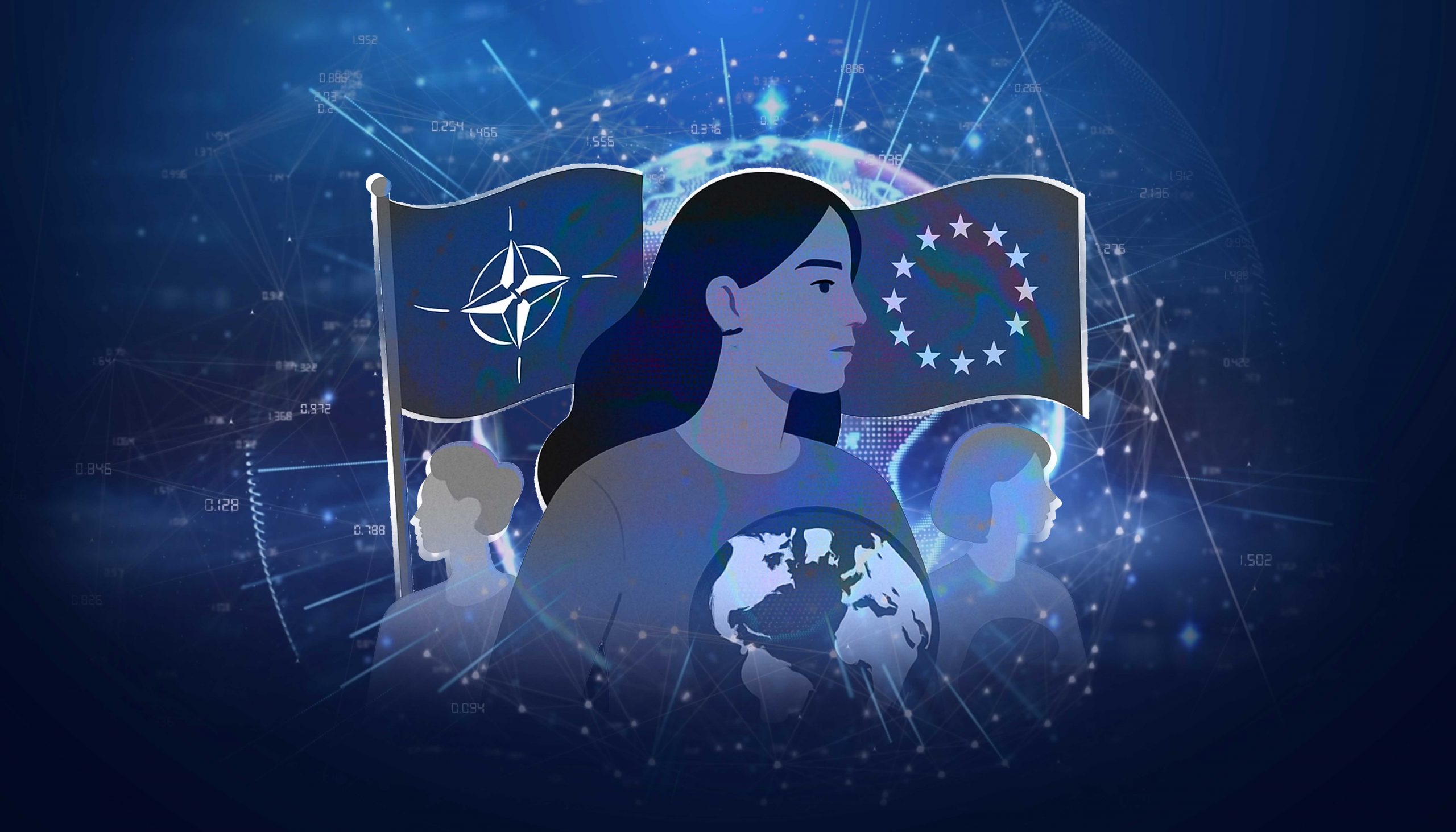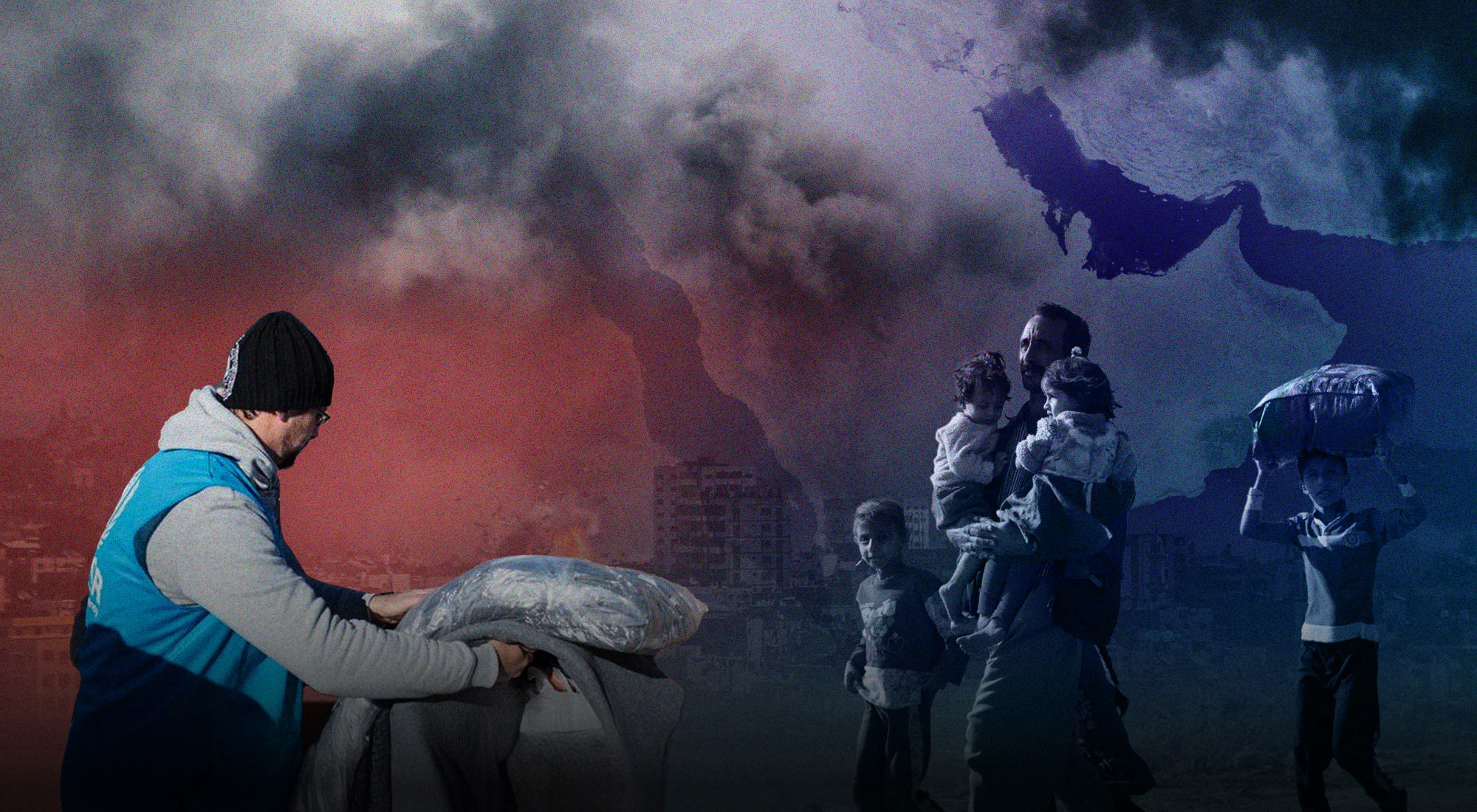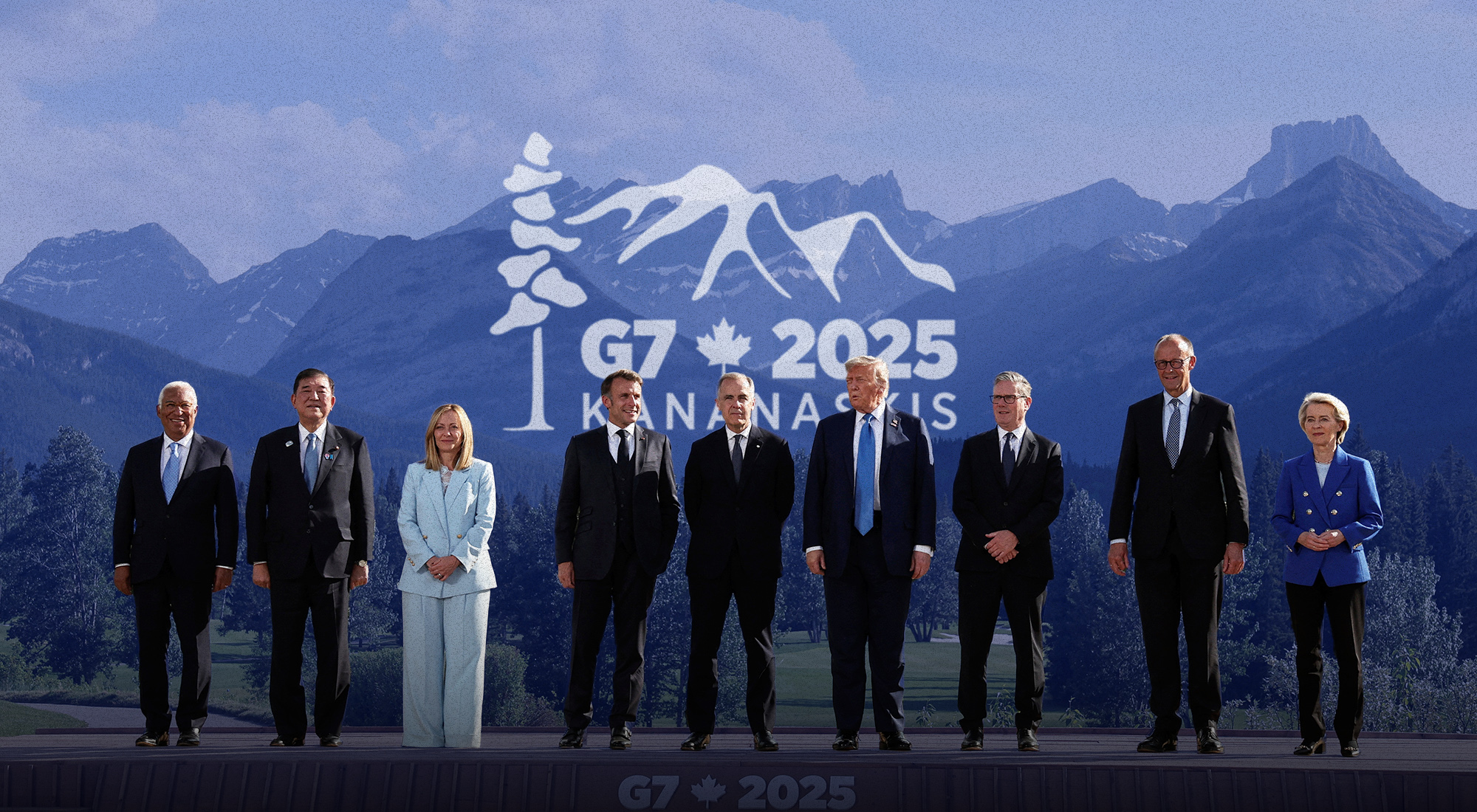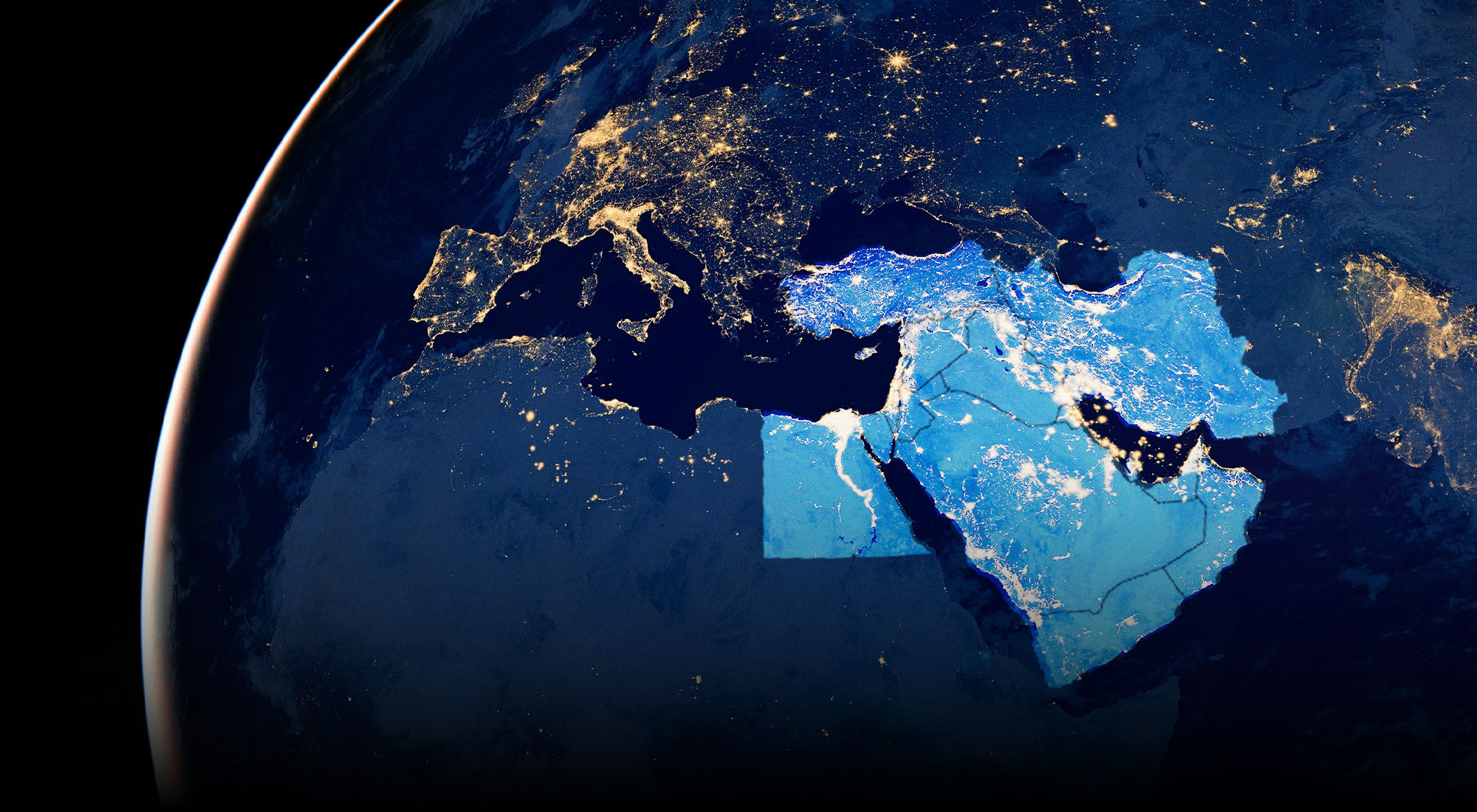Ukraine’s long and far-from-finished journey toward membership in the European Union (EU) began many years ago. After Ukraine gained independence amid the Soviet Union’s implosion in 1991, the Ukrainians had important debates over how their country should balance pro-EU aspirations with interests in maintaining stable relations with Russia. These divisions among Ukrainians had significant political, ideological, linguistic, geographical, and historical dimensions. The questions about Ukraine’s possible membership in the EU became increasingly pivotal in the aftermath of the 2004 Orange Revolution, of which a defining impulse was the conviction that Ukraine belonged to the European family.
Geopolitically, Ukraine has largely found itself in a tug-of-war between the West and Russia, whereby essentially any overtures that Kyiv would make to one side would automatically come at the expense of its relationship with the other. In 2013, citing pressure from the Kremlin, Ukraine’s then-President Viktor Yanukovych refused to sign an Association Agreement with the EU.[1] This decision fueled the 2013/14 Euromaidan Revolution (a.k.a. the Revolution of Dignity), which brought down Yanukovych’s government and later led to the Association Agreement’s signing on June 27, 2014.[2] Identifying the Euromaidan Revolution as a Western-sponsored coup d’état, Moscow justified its annexation of Crimea in March of that year, as well as its role in directly sponsoring Russian-speaking separatists in Eastern Ukraine, marking the beginning of the war in Donbas.
In September 2017, the Association Agreement went into force, enabling Ukraine and the EU to cooperate across various domains, from taxation to trade and counter-terrorism to border control.[3] In February 2019, then-President Petro Poroshenko signed a constitutional amendment that committed Ukraine to membership in both the EU and NATO.[4] Poroshenko called Ukraine’s entry into both Western institutions his “strategic membership” and said that his country should “submit a request for EU membership and receive a NATO membership action plan no later than 2023.”[5]
Ukraine’s EU aspirations amid the current war
On February 24, 2022, the Russian-Ukrainian war erupted, creating a geopolitical tsunami that fundamentally changed Europe’s security architecture. Four days after the war broke out, President Volodymyr Zelenskyy officially requested EU candidate status for his country. “We appeal to the European Union for Ukraine’s immediate accession under a new special procedure,” declared Zelensky in a video broadcast from Kyiv. “Our goal is to stand alongside all Europeans and, most importantly, to stand on their level.”[6]
Then on June 23, almost four months into the conflict, the EU’s 27 members unanimously voted in favor of granting Ukraine this status, marking a watershed moment in Ukraine’s history and gradual integration into the bloc.[7] While this development has been a major morale booster for Ukrainians amid the war, having candidate status comes with important practical implications that will make a difference for Ukraine.
Ukraine receiving candidate status by no means ensures a speedy entry into the bloc. Although polls show that 70 percent of Ukrainian citizens expect their country to enter the EU within five years, they will likely need to temper expectations.[8] Experts, including the Council of Foreign Relations’ Matthias Matthijs, argue that Ukraine will probably not obtain full-fledged membership for at least ten years, if not twenty.[9]
The EU’s current set of rules governing the bloc’s enlargement policies do not make it easy for countries to join, especially if they have not consolidated their democratic development. In fact, no country has gained membership since Croatia did in 2013.[10] Before a new country can commence negotiations to join the EU, it must meet the Copenhagen criteria.[11] Such requirements stipulate that the country in consideration has a functioning free-market economy, institutions that respect “European values” such as human rights and the rule of law, and a democratic and inclusive political system. If/when Ukraine can meet these criteria, all 27 EU members would need to agree to begin talks on the 35 negotiating chapters.
Certain EU states that generally oppose enlargement could create stumbling blocks. France has generally stood against plans for bringing in more countries. Officials in Paris have maintained that some Central and Eastern countries which joined earlier in this century were not prepared for membership, mostly due to corruption-related issues.[12] There are also concerns that power within the EU has shifted eastward at the expense of Western European countries’ interests.
Of the countries which have joined the EU over the years, the average time that passed between them receiving candidate status and officially entering the bloc was four years and 10 months.[13] The EU’s Eastern European countries took longer. Bulgaria and Romania, for example, applied for EU membership in 1995 but did not formally enter the multinational institution until 2007.[14]
Geographically larger than all current EU members, Ukraine would require massive amounts of financial support. Some politicians in Europe might not be enthusiastic about providing such assistance to the country, which is poorer than each of the EU’s current members. Repairing the damage which the war with Russia has inflicted on Ukraine will be extremely costly. Werner Hoyer, the European Investment Bank chief who leads the EU’s lending arm, said in June that Ukraine could need as much as EUR 1 trillion.[15] If Ukraine eventually becomes a member of the EU, the bloc’s members will have a major role to play in covering these costs.
Even if all 27 EU members unanimously supported starting the talks, there would again need to be agreement from each state in the bloc that Ukraine meets the requirements in all 35 negotiation chapters. Once that point is reached, the decision to bring in Ukraine would need the approval of the European Parliament and legislative agendas.
Although all EU members voted in favor of granting Ukraine candidate status in June, there are signs that some in the bloc might not support the country gaining full-fledged membership. For example, on April 23, Austrian Foreign Minister Alexander Schallenberg voiced his opposition to the EU granting Ukraine candidate status while advocating that the bloc provide the country with “another path” for its relationship with the EU.[16] Also, over the years, Hungary has been a stumbling block on Ukraine’s path to the transatlantic community with Prime Minister Viktor Orbán’s government opposing Ukrainian membership in both the EU and NATO.[17] Although Vienna and Budapest have had their own special reasons for previously voicing opposition to Ukrainian membership in the EU, many analysts contend that those objections stemmed from Austria and Hungary’s geopolitical concerns about Russia feeling increasingly threatened by the EU and NATO’s expansion into former Soviet space.
Ultimately, it is not clear how many EU members would support or oppose the war-torn country becoming a member in the future. Moreover, countries in the EU which may come out against Ukrainian membership could veto the country’s accession as a bargaining chip, further complicating the process of Ukraine entering the bloc. Throughout the Russian-Ukrainian war, the obstructionist policies of Orban’s government have already limited the extent to which unity has tightened against Moscow within both the EU and NATO.[18]
The reality of the Russian-Ukrainian war is the most serious impediment to Ukraine’s entry into the EU. Throughout the decades-old history of the bloc’s enlargement, no country beset by an unresolved border has joined the EU, except for Cyprus. Yet, a notable difference between Cyprus and Ukraine is that the former’s dispute was with an EU candidate, Turkey, not a country on hostile terms with most of the bloc’s members.
Ultimately, even if Ukraine were at peace and the government in Kyiv were exercising sovereignty over every inch of land in Ukraine’s UN-recognized borders, the country’s road to EU membership would still be long and fraught. Yet, the fact that Russia is at war with Ukraine and, as of June 2022, occupying roughly 20 percent of its territory makes it entirely unrealistic to imagine Ukraine quickly joining the bloc.[19] For Zelensky’s government, an end of the war with Russia is necessary for his country to begin the process of implementing the reforms required by the Copenhagen criteria.
To meet the requirements for EU membership, Ukraine must tackle corruption. The country’s officials “will have to show their willingness and desire to break the influence and importance of oligarchs,” explained David Stulík, a former EU diplomat in Kyiv who is currently a senior analyst at the Prague-based European Values Center for Security Policy.[20] “So, this is something that is very much related to anti-monopoly policies and I’m not sure if Ukraine and the Ukrainian leadership is ready to limit the power and influence of oligarchs, even though there is anti-oligarch law in place. So, this is kind of a benchmark for Ukraine by which we could judge whether the leadership is really determined to pursue this European track.”[21]
At the same time, Ukraine’s journey to EU membership could accelerate if the bloc were to reform its accession process. However, this would be up to the current members of the EU, without Ukraine having the means to influence such decision-making. Experts doubt that such changes from within the bloc are likely. “The major factor is that the EU is not ready for such an enlargement, especially by Ukraine. Ukraine is simply too big to be immediately integrated into the EU because all the decision-making mechanisms and rules would have to be significantly changed in order to accommodate Ukraine within the EU. This will require the internal reform of the EU,” said Stulík.[22]
Symbolism and practical implications for Ukraine
Although Ukrainians who are realistic about the country’s road to membership in the EU realize that this journey will probably take many years, the bloc granting Ukraine candidate status was a significant morale booster. The mood in Ukraine was celebratory and joyous after the EU’s 27 states unanimously voted in favor of making the conflict-ridden country a candidate for membership. The bloc’s decision sent a powerful message about the West wanting Ukraine in their community of states united by certain values. This was particularly meaningful for members of the Ukrainian military fighting in this war because the news about the country’s candidate status confirmed that their sacrifices were not in vain.
“This is the uplifting news…that we really needed to see, that in front of us is not only a fight for our freedom and for our sovereignty, but there is also a chance for our country,” explained Kira Rudik, a member of the Ukrainian Parliament and leader of the pro-European political party Golos, one day after her country received candidate status.[23]
However, this morale boost to Ukrainians was short-lived. Mikhail Minakov, a Ukrainian scholar who serves as the senior advisor on Ukraine and Editor-in-Chief of Focus Ukraine at the Kennan Institute of the Woodrow Wilson International Center for Scholars, was in Ukraine in June when the news broke about the country’s candidate status: “I was talking to different people in villages, in different sectors, in cities, in agriculture, in the army, in politics, and everyone reacted to the candidate status positively,” said Minakov.[24] “But if you talk to the same people today, they’d hardly remember about this candidate status,” he continued. “So, there was a week or two when the morale was boosted. But not anymore.”[25]
Although the EU granting Ukraine candidate status had much to do with morale and symbolism, there are also tangible benefits for the embattled country. Most importantly, Ukraine, now as a candidate, will have access to pre-accession funding through certain programs made available to all candidate countries. Mindful of the war’s disastrous impact on the Ukrainian economy, the country more than welcomes any financial assistance at this time. Additionally, because Ukraine now has candidate status, the EU will almost certainly provide Kyiv with a reconstruction package, which Brussels will manage and finance after the war ends, or at least freezes.
Since the EU granted Ukraine candidate status in the multinational institution, many discussions about the country’s road to full-fledged membership have overlooked an important set of points pertaining to tensions between Ukraine’s elites and average citizens. Even before officially joining the EU, Ukraine, as a candidate country, will be subjected to certain standards, with Brussels monitoring the country’s governance in ways that Ukraine has not previously experienced. It is unclear whether the political elites in Kyiv have considered such factors or have a real sense of awareness as to what such commitments to Brussels entail with the EU evaluating the Ukrainian government’s implementation of rule-of-law measures, anti-corruption policies, and so on.
“The Ukrainian leadership, and especially presidential office, which does not always have clear democratic objectives, will be under the tough scrutiny and screening of the European commission…the political leadership of Ukraine has voluntarily allowed the EU to voice legitimate concerns,” explained Stulík.[26]
“The political leadership of Ukraine has voluntarily allowed the EU to voice legitimate concerns, the state of legislative process in Ukraine. This is something that the Ukrainian political elites are not going to like. But it’s too late. They have maybe unconsciously surrendered their interests because they were under strong pressure both from the domestic audience, from their own citizens who want their country to be a member of the EU or NATO, as well as the friends of Ukraine within the EU—countries like those in Central Europe and the Baltic states. They will be pressing for the pro-democratic, pro-European reforms in Ukraine as much as possible. These countries definitely understand that a prosperous and democratic Ukraine is the best guarantee of their own security. That’s why I’d make a guess that we’ll see quite a lot of ‘misunderstandings’ between the Ukrainian political elites and the EU institutions when it comes to the assessment and evaluation of the democracy, rule of law, and respect of human rights in Ukraine,” added Stulík.
Moscow’s perspective
Moscow does not perceive Ukraine gaining EU membership as threatening Russia as much as Ukrainian membership in NATO, which unlike the EU is a military alliance. Yet the Kremlin’s foreign policy agenda in Europe aims to disrupt the expansion of both Western institutions, particularly with respect to countries which previously belonged to the USSR. Currently, three EU member-states are former Soviet republics: Estonia, Latvia, and Lithuania. Ukraine and Moldova, which also received EU candidate status on June 23, gaining membership in the bloc would more than quadruple the amount of former Soviet territory inside the EU.
In 2015, Russian President Vladimir Putin said that Ukraine’s integration into the EU was geared toward a mistaken effort to “disrupt an attempt to re-create the Soviet Union.”[27] Russia’s Deputy Prime Minister Dmitri Rogozin tied Moldova’s signing of the Association Agreement with the country eventually obtaining NATO membership.[28]
Highlighted by Moscow’s support for the breakaway republic of Transnistria since the early 1990s, the 2014 annexation of Crimea, and the overt attack on Ukraine on February 24, Moscow is keen to escalate conflicts, usurp territory, foment instability, and exacerbate political and social tensions in European countries near Russia to undermine the expansion of both the EU and NATO into the former Soviet space. “What’s going on in Ukraine could be seen as a Russian war against EU enlargement,” said Petr Tůma, a Czech career diplomat and a visiting fellow at the Atlantic Council’s Europe Center.[29] “It started in 2014. Granting candidacy status to Ukraine and supporting the country in its defense against Russian aggression are two sides of the same coin.”[30]
Moscow’s threat perception of Ukraine’s integration into the EU is perhaps more ideational than related to security. The Kremlin fears that if Ukraine joins the European family and perhaps one day thrives in the EU, the government in Moscow could face new challenges in terms of its own legitimacy at home in Russia.
“For Putin, it is of utmost importance to keep Ukraine—especially Ukraine, not even Moldova—out of the Euro-Atlantic community because any progress of countries like Ukraine and growing welfare of its citizens would lead to a situation when Russian citizens—not only themselves but also the Russian leadership—are asking why their Western neighbors are now living better than Russians despite having so many things in common,” according to Stulík.[31] “They have a common history. For many Russians, Ukrainians are perceived as younger brothers. So, the EU membership, or even the prospects of EU membership, could lead to increased living standards in Ukraine, which is sort of a life threat for the Russian regime and Putin.”[32]
References
[1] “Ukraine Protests after Yanukovych EU Deal Rejection,” BBC, November 30, 2013, https://www.bbc.com/news/world-europe-25162563.
[2] Sofiya Kominko, “Ukraine’s Nation-building Journey and the Legacy of the Euromaidan Revolution,” Atlantic Council, April 20, 2021, https://www.atlanticcouncil.org/blogs/ukrainealert/ukraines-nation-building-journey-and-the-legacy-of-the-euromaidan-revolution/; Steven Pifer, “Poroshenko Signs EU-Ukraine Association Agreement,” The Brookings Institution, June 27, 2014, https://www.brookings.edu/blog/up-front/2014/06/27/poroshenko-signs-eu-ukraine-association-agreement/.
[3] “Ukraine Needs to Implement 107 Regulations under Association Agreement with EU,” Xinhua, August 11, 2022, https://english.news.cn/20220811/03065fb6d1394c898600dcbfade26b89/c.html.
[4] “Ukraine President Signs Constitutional Amendment On NATO, EU Membership,” Radio Free Europe Radio Liberty, February 19, 2019, https://www.rferl.org/a/ukraine-president-signs-constitutional-amendment-on-nato-eu-membership/29779430.html.
[5] Ibid.
[6] Matthew Mpoke Bigg, “Zelensky, in a Passionate Speech, Urges the E.U. to Admit Ukraine Immediately,” The New York Times, February 28, 2022, https://www.nytimes.com/2022/02/28/world/europe/ukraine-european-union-zelensky.html.
[7] Pavel Polityuk and Vitalii Hnidyi, “EU Grants Ukraine Candidate Status in ‘Historic Moment’,” Reuters, June 23, 2022, https://www.reuters.com/business/aerospace-defense/ukraine-becomes-eu-membership-candidate-battle-east-enters-fearsome-climax-2022-06-23/.
[8] Kyiv Post, Twitter Post, June 21, 2022, https://twitter.com/KyivPost/status/1539202128937361410?s=20&t=AP5AxmG2jIzljvqHRRyejw.
[9] Matthias Matthijs, “Ukraine Could Become an EU Member. What Would That Mean?” Council on Foreign Relations, June 28, 2022, https://www.cfr.org/in-brief/ukraine-could-become-eu-member-what-would-mean.
[10] “Croatia Celebrates on Joining EU,” BBC, July 1, 2013, https://www.bbc.com/news/world-europe-23118035.
[11] “European Union Maps,” BBC, February 25, 2014, https://www.bbc.com/news/world-middle-east-24367705.
[12] Erwan Fouéré, “Macron’s ‘Non’ to EU Enlargement,” Centre for European Policy Studies, October 22, 2019, https://www.ceps.eu/macrons-non-to-eu-enlargement/.
[13] Luke McGee, “Why Ukraine’s Longshot Bid to Join the EU Is Likely to Enrage Putin,” CNN, June 17, 2022, https://www.cnn.com/2022/06/16/europe/ukraine-nato-membership-putin-analysis-cmd/index.html.
[14] “Two New Members Join the EU Family,” European Commission, December 28, 2006, https://ec.europa.eu/commission/presscorner/detail/en/IP_06_1900.
[15] Steven Arons, “Ukraine Reconstruction May Cost $1.1 Trillion, EIB Head Says,” Bloomberg, June 21, 2022, https://www.bloomberg.com/news/articles/2022-06-21/ukraine-reconstruction-may-cost-1-1-trillion-eib-head-says#xj4y7vzkg.
[16] “Ukraine Criticizes Austrian Minister over Comments about EU Membership,” Radio Free Europe Radio Liberty,” April 24, 2022, https://www.rferl.org/a/ukraine-austria-eu-comments/31818924.html.
[17] Péter Krekó and Patrik Szicherle, “Why Is Hungary Blocking Ukraine’s Western Integration?” Atlantic Council, January 16, 2018, https://www.atlanticcouncil.org/blogs/ukrainealert/why-is-hungary-blocking-ukraine-s-western-integration/.
[18] David Leonhardt, “Autocrats Strain Unity,” The New York Times, May 18, 2022, https://www.nytimes.com/2022/05/18/briefing/russia-ukraine-turkey-hungary-nato-kharkiv.html.
[19] The Presidential Office of Ukraine, “Speech by the President of Ukraine in the Chamber of Deputies of Luxembourg,” June 2, 2022, https://www.president.gov.ua/en/news/promova-prezidenta-ukrayini-v-palati-deputativ-lyuksemburgu-75533.
[20] David Stulík, Interview with Author, July 18, 2022.
[21] Ibid.
[22] Ibid.
[23] “EU leaders Grant Ukraine and Moldova Candidate Status,” Deutsche Welle, June 24, 2022, https://www.youtube.com/watch?v=r6PdPerZKj8.
[24] Mikhail Minakov, Interview with Author, July 18, 2022.
[25] Ibid.
[26] David Stulík, Interview with Author, July 18, 2022.
[27] Raphael S. Cohen and Andrew Radin, “Russia’s Hostile Measures in Europe,” RAND Corporation, January 1, 2019, https://www.rand.org/pubs/research_reports/RR1793.html.
[28] Sergei Aleksashenko, “For Ukraine, Moldova, and Georgia Free Trade with Europe and Russia Is Possible,” July 3, 2014, Carnegie Endowment for International Peace, https://carnegiemoscow.org/commentary/56074.
[29] Petr Tůma, Interview with Author, July 19, 2022.
[30] Ibid.
[31] David Stulík, Interview with Author, July 18, 2022.
[32] Ibid.



